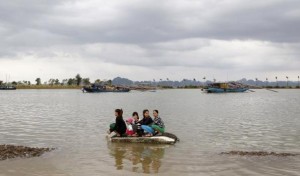As the news reports the terrible death and destruction in the Philippines resulting from the worst storm ever recorded, I feel sick with worry. As an environmental sociologist and a vegan researcher, I’m well aware that these storms are only going to worsen and become more common as global warming continues to influence catastrophic climate change. Researchers have already documented that natural disasters are on the rise and we have every reason to predict this trend will continue.
Along with the heartache I feel from these news stories is an unavoidable annoyance with those who insist that global warming is not real, is a hoax, or is a “natural” event. Indeed, about half of Americans, most of whom have been influenced by conservative interests, believe that global warming is not a human-made phenomenon. This frustrates me to no end because it is our ignorance here in the West that is hurting those living in third world regions. It’s easy for us to kick back and ignore the scientific consensus about global warming when we’re living privileged lives here in the West. While natural disasters are also on the rise here, it is people (human and nonhuman) living in the Global South who are especially impacted. These are regions are close to sea level with high coastal populations, weak infrastructures, agriculture-based/weather dependent undiversified economies, high levels of poverty, and pitiful few resources to cope with disaster. When a major storm hits, it is more likely to hit one of these areas. Due to centuries of colonization and capitalist exploitation, these are the very areas that are least able to survive them.
So where does veganism come in? Research shows that Nonhuman Animal agriculture accounts for 51% or more of Greenhouse Gas emissions. Many cultures living in the Global South have traditionally been plant-based, but increasingly, global capitalist pressures have pushed them into adopting Western diets and producing Nonhuman Animals and their feed. The Global South is exploited as a producer of non-vegan products, a market for our non-vegan products, and a dumping ground for the pollution those products create. The inevitable natural disasters that also burden these area are also tied to this globalized project of speciesism.
Many international governance bodies have begun to question the dangerous consequences of Nonhuman Animal agriculture, but many succumb to capitalist interests and suggest reform rather than abolition. The capitalist system itself is inherently exploitative and will always create high levels of suffering, but if we insist on retaining this economic mode of production, we need to get realistic about animal-based food systems. Reformed systems still allow for the 65+ billion (and growing) Nonhuman Animal deaths each year. Reformed systems also allow for a litany of debilitating and deadly diet-related diseases, which disproportionately impact poor persons. These reforms also allow for continued environmental destruction and global warming which hits the global poor the hardest. If we want to curb this massive, global-scale suffering, we must prioritize veganism.
 Dr. Wrenn is Lecturer of Sociology. She received her Ph.D. in Sociology with Colorado State University in 2016. She received her M.S. in Sociology in 2008 and her B.A. in Political Science in 2005, both from Virginia Tech. She was awarded Exemplary Diversity Scholar, 2016 by the University of Michigan’s National Center for Institutional Diversity. She served as council member with the American Sociological Association’s Animals & Society section (2013-2016) and was elected Chair in 2018. She serves as Book Review Editor to Society & Animals and has contributed to the Human-Animal Studies Images and Cinema blogs for the Animals and Society Institute. She has been published in several peer-reviewed academic journals including the Journal of Gender Studies, Feminist Media Studies, Disability & Society, Food, Culture & Society, and Society & Animals. In July 2013, she founded the Vegan Feminist Network, an academic-activist project engaging intersectional social justice praxis. She is the author of A Rational Approach to Animal Rights: Extensions in Abolitionist Theory (Palgrave MacMillan 2016).
Dr. Wrenn is Lecturer of Sociology. She received her Ph.D. in Sociology with Colorado State University in 2016. She received her M.S. in Sociology in 2008 and her B.A. in Political Science in 2005, both from Virginia Tech. She was awarded Exemplary Diversity Scholar, 2016 by the University of Michigan’s National Center for Institutional Diversity. She served as council member with the American Sociological Association’s Animals & Society section (2013-2016) and was elected Chair in 2018. She serves as Book Review Editor to Society & Animals and has contributed to the Human-Animal Studies Images and Cinema blogs for the Animals and Society Institute. She has been published in several peer-reviewed academic journals including the Journal of Gender Studies, Feminist Media Studies, Disability & Society, Food, Culture & Society, and Society & Animals. In July 2013, she founded the Vegan Feminist Network, an academic-activist project engaging intersectional social justice praxis. She is the author of A Rational Approach to Animal Rights: Extensions in Abolitionist Theory (Palgrave MacMillan 2016).
Receive research updates straight to your inbox by subscribing to my newsletter.

